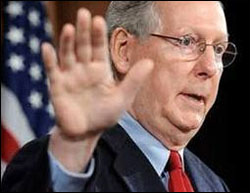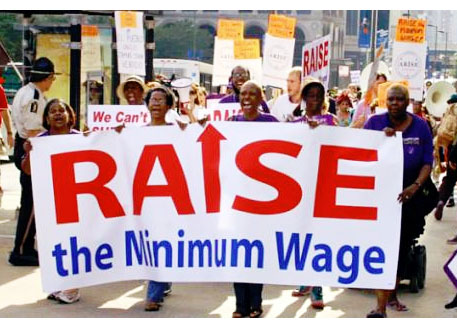The Democratic-controlled U.S. House of Representatives voted Thursday to raise the federal minimum wage, which has been frozen at $7.25 an hour for more than 10 years, to $15 an hour by the year 2025 and index it so future increases are automatic. Importantly, the “Raise the Wage Act of 2019” (HR 582) also would phase out the federal sub-minimum wage for tipped workers, which has been stuck at just $2.13 an hour since 1991.

All seven of Washington’s Democratic House delegation — Reps. Suzan DelBene, Rick Larsen, Derek Kilmer, Pramila Jayapal, Kim Schrier, Adam Smith and Denny Heck — supported the measure. They voted against a Motion to Recommit on Thursday, a business-backed effort to send the bill back to committee that very narrowly failed 210-218, and then they voted “yes” on HR 582’s final passage, approved on a 231-199 vote.
 Washington Republican Reps. Cathy McMorris Rodgers, Jaime Herrera Beutler and Dan Newhouse all voted against the bill.
Washington Republican Reps. Cathy McMorris Rodgers, Jaime Herrera Beutler and Dan Newhouse all voted against the bill.
HR 582 would have little effect in Washington state, which has no sub-minimum tipped wage and is already scheduled to increase its state minimum wage at a pace that would put it above $15 by 2025. But it would have a dramatic effect for millions of the lowest-wage workers in America, who have suffered as the 10-year minimum wage freeze has eroded their buying power and forced many of them, including full-time workers, to live in poverty.
 The Republican-controlled Senate is unlikely to consider HR 582. Majority Leader Mitch McConnell(R-Ky.) says he will block the bill from consideration.
The Republican-controlled Senate is unlikely to consider HR 582. Majority Leader Mitch McConnell(R-Ky.) says he will block the bill from consideration.
But as a New York Times notes today, “(the bill’s House passage) previews what Democrats would do if they capture the Senate and the White House in 2020, and it demonstrates how fast the politics have shifted since 2012, when fast-food workers began to strike in cities around the country, demanding $15-an-hour wages and a union.”
Rep. Alexandria Ocasio-Cortez (D-NY) called the vote a “huge deal,” but she signaled the fight is not over.
“It’s not just about $15, it’s about $15 and a union,” said Rep. Alexandria Ocasio-Cortez (D-NY). “Fifteen started 10 years ago, so what is that pegged to inflation today? That’s why what we fight for is a living wage. So I think that this vote is an important milestone.”
 At $7.25/hour, a full-time worker earns just $15,000 a year, which is $10,000 less than the federal poverty level for a family of four. In the 10 years it has been frozen — the longest the minimum wage has gone without an increase since it was established during the Great Depression — America’s lowest-paid workers have lost about $3,000 a year when you consider the rising cost of living, according to the Economic Policy Institute.
At $7.25/hour, a full-time worker earns just $15,000 a year, which is $10,000 less than the federal poverty level for a family of four. In the 10 years it has been frozen — the longest the minimum wage has gone without an increase since it was established during the Great Depression — America’s lowest-paid workers have lost about $3,000 a year when you consider the rising cost of living, according to the Economic Policy Institute.
Phasing in a $15 minimum wage would benefit 41 million American workers and begin to address the growing crisis of wage inequality. More than half of the workers who would benefit are adults between the ages of 25 and 54, and nearly two-thirds work full time. More than half (56 percent) are women, nearly 30 percent of whom have children.
Raising the minimum wage to $15 has the support of an overwhelming majority of Americans, and the benefits far exceed any potential cost. Multiple studies have shown that modest increases in the minimum wage have not resulted in significant job loss, and the income boost experienced by low-income families benefits the country overall by reducing both poverty and income inequality.